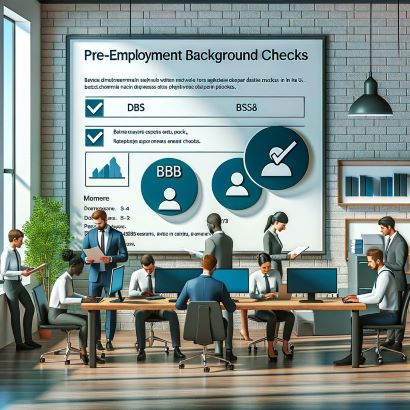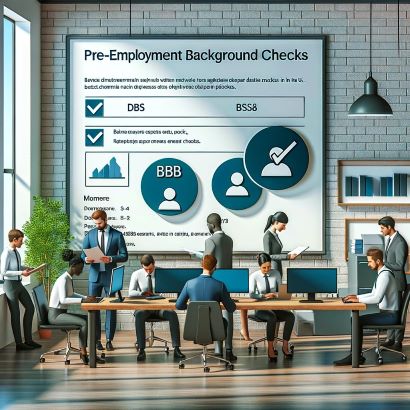

Unlike BPSS checks, DBS checks are required for positions involving contact with vulnerable groups, such as in teaching, healthcare, and social services. Verifying identity and right to work involves checks against databases and sometimes contacting issuing authorities, especially if there are concerns over the authenticity of the documents. BPSS checks are generally quicker to complete, often within a few weeks, reflecting their role as a baseline security measure. right to work checks as well as a basic dbs checks are part of bpss clearance in the uk.
Remember, attention to detail in gathering these documents could be the difference-maker in your clearance journey. Providing evidence of at least three years of employment history is an important requirement for BPSS clearance.
For positions within the UK government and its contractors, BPSS clearance is not just a formal requirement but a critical security measure. Ensuring that individuals have BPSS clearance helps maintain national security and reduces the risk of insider threats.
Conversely, BS7858:2019 can require a more thorough examination, potentially including spent convictions and other details depending on the risk assessment of the specific job role, reflecting its focus on positions where security is critically important. By ensuring that employees do not have harmful criminal backgrounds, organizations can maintain a safe and secure working environment.
Typically in the UK, a standard BPSS check may range from £50 to £100. Regarding regulatory compliance, both standards must adhere to the UK's data protection laws, including GDPR. DBS checks are more detailed and can include checks on spent and unspent convictions, cautions, reprimands, and warnings held in the UK Police records, depending on the level of check required. Vetting process
By mandating BPSS checks for these specific roles and sectors, organizations can maintain secure environments, prevent unauthorized access to data, and enhance trust in their recruitment processes. This timeframe assumes that there are no complications, such as discrepancies in the information provided or delays in receiving necessary documents from third parties.
Ensuring your legal right to work in the UK is documented is an essential step in the BPSS clearance process. This clearance provides a baseline level of assurance on the reliability, trustworthiness, and integrity of prospective personnel.
BPSS is suitable for general employment in government-related roles requiring a basic level of security assurance. The individual's personal circumstances can also impact the time it takes to complete a BPSS check.
Posted by Jasmine Roberts on 2024-01-25

Discover BPSS requirements for IT and cybersecurity roles.
Posted by Jasmine Roberts on 2023-12-24
Posted by Jasmine Roberts on 2023-10-07

Discover what BPSS clearance is and why it's essential in the UK.
Posted by Jasmine Roberts on 2023-07-23
Posted by Jasmine Roberts on 2023-05-27
Posted by Jasmine Roberts on 2023-05-27
Posted by Jasmine Roberts on 2023-02-02
BPSS checks are governed by standards set by the UK government, specifically designed to comply with national security guidelines for personnel working in secure environments. Maintain your BPSS clearance by understanding the validity period and renewal requirements. These include the accuracy of the information provided by the applicant, the speed with which previous employers respond to verification requests, and the specific requirements of the employing organization.
The right to work check under BPSS serves as a legal safeguard that prevents illegal employment. Criminal Records Check: Verification of any unspent criminal records is crucial for evaluating suitability for BPSS clearance.
Continuous monitoring and updating of BPSS clearance are recommended for roles that involve ongoing security concerns. Be honest and consistent to avoid failing the BPSS check.
By verifying nationality, immigration status, employment history, and criminal records, organizations can assess the suitability of candidates for positions requiring access to sensitive information like the Public Services Network (PSN). Employment gaps analysis Your BPSS clearance is typically valid for 3 years from the date of issue.

In conclusion, digital technology has profoundly impacted the BPSS process by making it faster, more accurate, and more secure. Depending on the severity and nature of the crime, certain offenses may disqualify individuals from obtaining BPSS clearance. Addressing inconsistencies or gaps in the information provided by the individual undergoing BPSS clearance may necessitate additional time and effort to resolve.
This involves informing candidates that a BPSS check will be conducted, what the check entails, and what specific information will be gathered. Yes, you can fail a BPSS check if there are discrepancies in your identity verification, right to work status, criminal records, or employment history.
To continue accessing government assets, renewal of your BPSS clearance is necessary after this 3-year period. Delving into the intricacies of BPSS clearance can reveal a world of protocols, challenges, and future adaptations that are essential for maintaining security standards.
Transportation officials, especially those involved in overseeing or managing public transport security, require BPSS clearance due to the potential risks associated with transportation infrastructure and mass transit systems. For example, individuals who have frequently moved or changed jobs may require more extensive checks on their background, thus extending the process.


In some cases, BPSS checks can encounter delays if discrepancies or issues need to be resolved, such as gaps in employment or discrepancies in personal information. BPSS checks are typically required for individuals working in, or on behalf of, the UK government. NHS staff, particularly those in positions with access to personal and sensitive patient data, require BPSS clearance to protect patient confidentiality and ensure the integrity of medical services.
Follow these steps to guarantee a thorough BPSS clearance:1. **Verify Right to Work:** Check the individual's legal right to work status in the country.2. **Conduct Identity Check:** Authenticate the person's identity through official documents like passports or driver's licenses.3. **Check Criminal Records:** Perform a background check to identify any criminal history that could pose a risk.4. **Confirm Employment History:** Validate the accuracy of the individual's employment history to ensure transparency and honesty. Ensuring the right to work involves validating an individual's legal status to be employed in the country.
Coordinating with overseas authorities for document verification and background checks adds another layer of difficulty, extending the time required for completion. When undergoing a BPSS check, you're subjected to a thorough screening process to confirm your trustworthiness and eligibility for accessing sensitive information.
There are also specific rules regarding non-discrimination that must be followed during the BPSS process. These components collectively contribute to a thorough assessment of an individual's background, aiding organizations in making informed decisions regarding their suitability for roles requiring access to sensitive information.

The role of verifying the right to work is a crucial component of the Baseline Personnel Security Standard (BPSS) checks in the UK. Reviewing a candidate's employment history is another vital component of the BPSS checks. Employers should manage expectations and provide candidates with as much information as possible about what to expect during the BPSS clearance process to ensure a smooth and efficient vetting experience.
Providing a valid passport or driver's license is essential for verifying your identity when applying for BPSS clearance. Each of these areas is carefully examined to ensure that the individual does not pose a security risk.
Some organizations require a new DBS check every three years or have policies for more frequent updates, reflecting the ongoing need to protect vulnerable populations. When distinguishing between BPSS and DBS checks, it's vital to recognize that BPSS focuses on national security vetting, identity verification, and right to work status, while DBS solely examines an individual's criminal record.
To get an accurate cost estimate, it's advisable to request a quote from a trustworthy screening provider. This process involves reaching out to past employers to confirm periods of employment, roles held, and reasons for leaving, which can take time if past employers are slow to respond or if the candidate has worked internationally.
In contrast, DBS checks might need to be renewed more frequently, especially for positions involving regular contact with vulnerable groups. For compliance, it is vital that employers keep records of the documents checked as part of the right to work process. To grasp the significance of BPSS screening, consider its role in verifying essential personal and professional details for individuals in sensitive positions with access to government assets.
Ultimately, BPSS clearance plays a critical role in maintaining a secure work environment, reducing risks, and building trust in recruitment processes and decision-making. The initial stages of a BPSS check involve gathering personal information from the candidate, including identity documents, employment history, and nationality status.
Verifying your time spent abroad enables a thorough background check to determine your integrity and identify any security risks that may arise from those stays. The nationality and immigration status check confirms the candidate's eligibility to work in the UK.
Complex employment histories or discrepancies in provided information may further slow down clearance procedures. By adhering to these rules, employers not only protect the integrity of their operations but also uphold the rights and dignity of their employees, ensuring a secure and respectful work environment. Employment law

BPSS Clearance is generally not transferable. Each employer may conduct its own vetting process to ensure compliance with internal security policies.
Renewal of BPSS Clearance depends on the employer’s policies and job-specific requirements. Some employers may require periodic reviews to maintain clearance validity.
Roles in IT security, government services, defense contracting, and public sector administration often require BPSS Clearance due to their access to sensitive information and secure systems.
Delays in BPSS Clearance can occur due to incomplete applications, missing documents, or extended reference checks. Applicants should ensure all information is accurate and complete.
Employers rely on BPSS Clearance results to make informed hiring decisions for sensitive roles. It helps ensure candidates meet security standards required for the job.
Once a BPSS application is submitted, the employer reviews the documents, verifies references, and conducts identity and background checks before granting clearance.
Government roles require BPSS Clearance to ensure that employees handling sensitive information are trustworthy, legally authorized to work, and free of disqualifying criminal histories.
Employers conducting BPSS screening must comply with UK data protection laws. Personal data is stored securely and used only for vetting purposes.